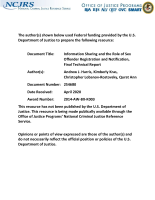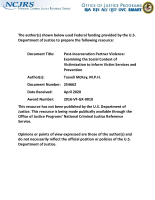Crime prevention
Police Research - An Important Tool for Police, Often Underutilized
Understanding Domestic Radicalization and Terrorism: A National Issue Within a Global Context
Countering Technology-Facilitated Abuse: Criminal Justice Strategies for Combating Nonconsensual Pornography, Sextortion, Doxing, and Swatting
Summary Overview Report: Student Threat Assessment as a Safe and Supportive Prevention Strategy
Final Summary Overview: Understanding the Impact of School Safety on the High School Transition Experience: From Etiology to Prevention
At-Risk Youth in Schools: A Wraparound Delinquency Prevention Program Produces Disappointing Results
At-Risk Youth in Schools: A Wraparound Delinquency Prevention Program Produces Disappointing Results
A rigorous evaluation of a well-grounded pilot program to boost the school performance and behavior of at-risk youth and improve safety in Palm Beach, Florida, schools revealed few positive or negative effects.
A Comprehensive School Safety Framework: Report to the Committees on Appropriations
Feras Ismail
Geography and Public Safety: A Quarterly Bulletin of Applied Geography for the Study of Crime and Public Safety, Volume 2, Issue 4
Juveniles in Residential Placement, 2017
Implementing a School Tip Line? New Research Provides a Blueprint
Video Games Designed To Address Sexual Assault on Campus
Video Games Designed To Address Sexual Assault on Campus
NIJ-funded research assessing video games designed to reduce sexual assault on campus yielded some positive results, but showed a lack of sustained benefits on key metrics.



